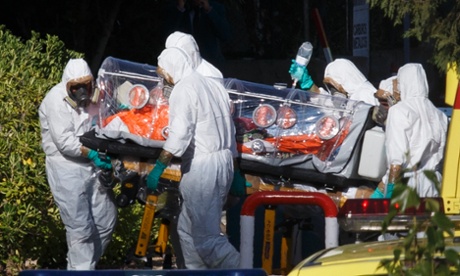Investigations are under way at a hospital in Madrid after a Spanish nurse became the first person known to have contracted the deadly Ebola virus outside West Africa.
The nurse had treated two Spanish missionaries who died of the disease after being flown home from the region.
Three other people, including the nurse’s husband, have been quarantined.
The European Commission has asked Spain to explain how the nurse could have become infected.
Some 3,400 people have died in the outbreak – mostly in West Africa.
The Spanish auxiliary nurse, a 40-year-old woman who has not been named, was one of about 30 staff at the Carlos III hospital in Madrid who had been treating priests Manuel Garcia Viejo and Miguel Pajares, officials say.
Mr Garcia Viejo, 69, died at the hospital on 25 September after catching Ebola in Sierra Leone. Mr Pajares, 75, died in August after contracting the virus in Liberia.
Madrid healthcare director Antonia Alemany told reporters that according to the information available: “The nurse went into the room wearing the individual protection gear and there’s no knowledge of an accidental exposure to risk.”
Shortly afterwards the nurse went on holiday, a hospital spokesman said, but fell ill on 30 September and was admitted to Alcorcon hospital in south-west Madrid on Sunday after being tested positive for Ebola.
Early on Tuesday she was moved under police escort to Carlos III hospital in the capital and is said to be in a stable condition.
Her husband and a second nurse who treated the missionary are now in quarantine, officials said, as well as a man who recently arrived on a flight from Nigeria.
Public health director Mercedes Vinuesa told parliament on Tuesday that a list of people the nurse might have had contact with was being drawn up so they could be monitored.
It was not clear where the nurse had gone on holiday.
It is also unclear how she could have contracted Ebola.
The hospital was reported to have had extreme protective measures in place including two sets of overalls, gloves and goggles.
However, health workers told El Pais newspaper that the clothing did not have level-four biological security, which is fully waterproof and with independent breathing apparatus.
Instead it was level two, the paper says, as photographs provided by staff indicated that the overalls did not allow for ventilation and the gloves were made of latex and bound with adhesive tape.
Such a facility would use a specially designed tent with controlled ventilation to house the patient’s bed – this allows staff to provide clinical care while containing the infection.
Any clinical waste such as syringes, paper towels or clothing from the patient should be incinerated. A dedicated laboratory should be used to carry out any necessary tests.
European Commission spokesman Frederic Vincent said a letter had been sent to the Spanish health minister “to obtain some clarification” about how the nurse had contracted Ebola despite all the precautions taken.
“There is obviously a problem somewhere,” he said.

















